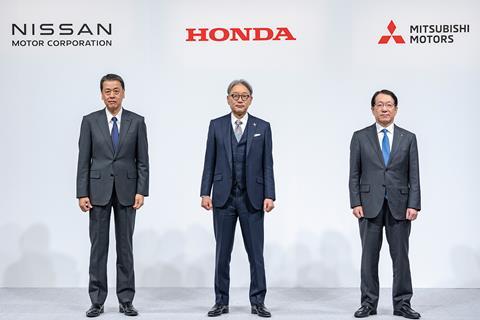The carmakers are also in discussions with Mitsubishi over potential collaboration on standardised products and processes.

Honda and Nissan signed a memorandum of understanding (MoU) on December 23 to discuss business integration and the establishment of a joint holding company to better cope with current pressures on carmaking. The Japanese OEMs aim to make a decision about the integration by the end of January 2025 with a definitive agreement set for June 2025.
In a statement they said that by integrating their vehicle and motorcycle businesses, along with power products and aviation, they could deliver better products and services to customers worldwide and become a leading global new mobility company.
On the same day the two carmakers signed a separate MoU with Mitsubishi Motors to explore its own involvement in the business integration, with a decision also tabled for the end of January.
Honda and Nissan have been already working together on a number of collaborative initiatives in 2024, having signed an MoU in March for a strategic partnership on battery EVs and vehicle intelligence, two of the main areas in which the automotive sector is transforming the products it makes.
At the same time, faced with volatile and uncertain trends in global vehicle production, notably for electric or new energy vehicles (NEVs), carmakers are looking for greater security through strategic partnerships that bring cost efficiencies through shared production and sourcing. That comes at a time of heightened investment in pure battery EVs equipped with intelligent software. While demand for intelligent EVs remains volatile, the partnerships also ensure continued combustion-engine and hybrid vehicle production, where sales continue to be more secure.
Some of the current risks to automotive production identified by Honda, Nissan and Mitsubishi include economic volatility, market demand fluctuations and the competitive environment, as well as changes in laws and environmental regulations. The carmakers have also noted the increase in tariffs and the introduction of import regulations in major markets. Those factors are putting pressure on individual carmakers to deliver value, something Honda and Nissan have identified as central to their collaboration.
“If realised, I believe that by uniting the strengths of [Nissan and Honda], we can deliver unparalleled value to customers worldwide who appreciate our respective brands,” said Nissan’s director, president and CEO and representative executive officer Makoto Uchida. “Together, we can create a unique way for them to enjoy cars that neither company could achieve alone.”
The carmakers are looking at standardising their vehicle platforms across product segments to reduce costs, developing efficiencies and improving investments through standardised production processes.
Honda’s director and representative executive officer, Toshihiro Mibe, said that by the end of January 2025 Honda and Nissan aimed to be “the one and only” company creating new mobility through synthesis of the two teams.
In a joint statement the carmakers said shared production lines and optimised manufacturing would improve capacity utilisation and reduce fixed costs. They also said that streamlined purchasing operations and common parts sourcing from the same supply chain would boost competitiveness. That common parts sourcing could also has advantages in terms of cost effectiveness from a logistics perspective.
Continued collaboration
Along with the agreement signed in March 2024, Honda and Nissan signed a further MoU in August 2024 to deepen the framework of the agreement and announced they had agreed to carry out joint research in fundamental technologies in the area of platforms for next-generation software-defined vehicles (SDVs), particularly in the areas crucial for intelligence and electrification.
Regarding the involvement of Mitsubishi, its director, representative executive officer, president and CEO, Takao Kato, said business integration between Honda and Nissan would bring value to the collaborative businesses each has with Mitsubishi Motors. “In order to realise synergies and to make the best use of each company’s strengths, we will also study the best form of cooperation,” he said.
Honda’s Toshihiro Mibe said the automotive industry was going through a centenary change and he hoped that Mitsubishi Motors’ participation in the business integration discussions of Nissan and Honda will contribute to the establishment of a leading company in creating new value in mobility through business integration. “Nissan and Honda will start the discussion from today onwards with an aim to clarify the possibility of business integration by around the end of January in line with the consideration of Mitsubishi Motors,” he said.
Examples of synergies for discussion by Honda and Nissan
Scale advantages by standardising both companies’ vehicle platforms
Enhancement of development capabilities and cost synergies through integration of R&D functions
Optimising manufacturing systems and facilities
Strengthening competitive advantages across the supply chain through purchasing function integration
Realising cost synergies through operational efficiency improvements
Acquisition of scale advantages through integration of sales finance functions
Establishment of talent foundation for intelligence and electrification
*In other news GAC Honda Automobile, a production and sales joint venture in China between Honda and GAC, has begun operations at its new energy vehicle (NEV) plant in Guanzhou City, called the Development District NEV Factory. Honda said the plant features automated parts logistics and is using AI-based welding strength inspection. The carmaker added that approximately 30% of the entire assembly process is automated to achieve a highly efficient production line.

























![Global[1]](https://d3n5uof8vony13.cloudfront.net/Pictures/web/a/d/s/global1_726550.svgz)













No comments yet